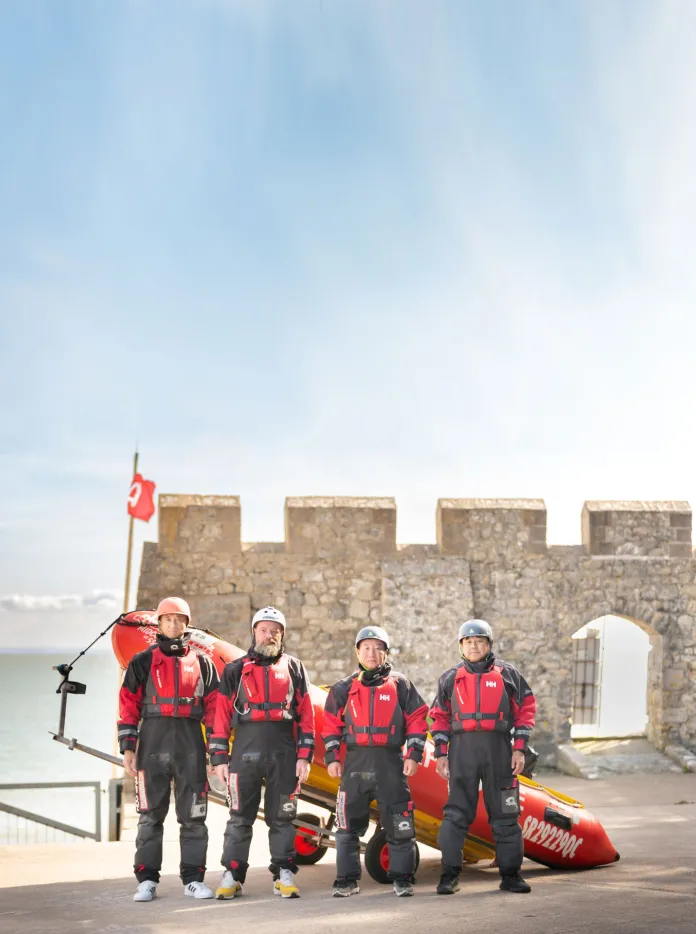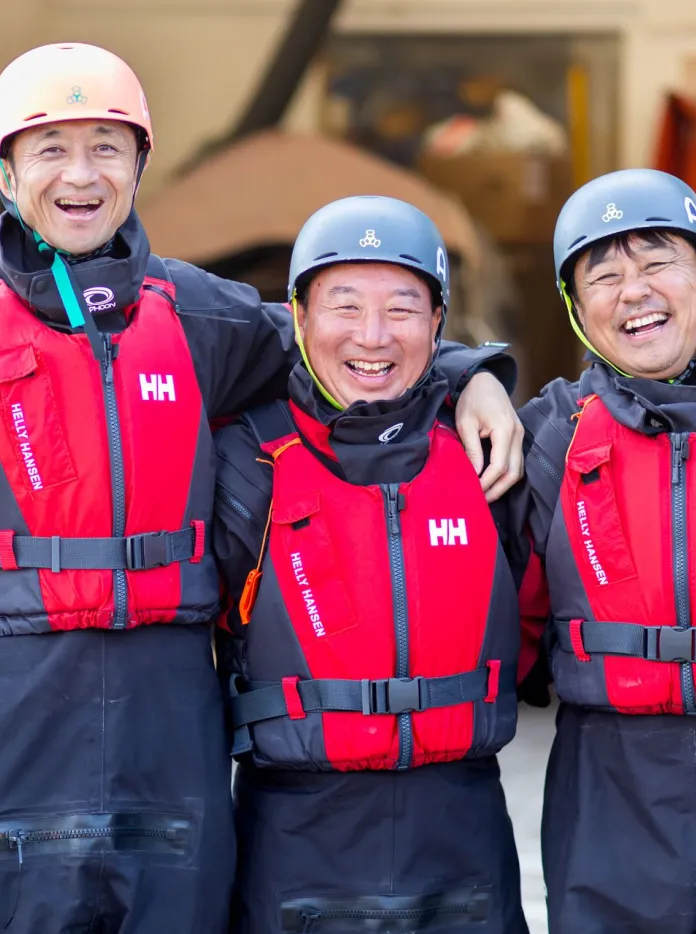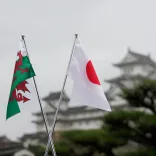Founded by Kurt Hahn in 1952, UWC Atlantic became first of the 18 United World Colleges across four continents, including UWC ISAK Japan. Decades later, an unexpected bond between students in Wales and the people of Japan created a unique shared mission: saving lives at sea with a lifeboat in a box.
In 2014, Robin Jenkins, an alumnus of UWC Atlantic and a volunteer with the UK’s Royal National Lifeboat Institution (RNLI), visited Nebama, Japan, as part of a creative research collaboration between the University Arts London and the Tohoku Future Lab, a Japanese organisation focused on post-tsunami community rebuilding.
During this trip, Robin visited the village of Nebama and encountered harrowing stories from survivors who, after the tsunami, searched for loved ones in freezing, dark conditions, hearing cries for help from others stranded in the sea without rescue.
As a seasoned sailor and RNLI volunteer Robin asked his hosts, “Where is your lifeboat?” Their heartbreaking response: “What is a lifeboat?”
Despite Japan’s rich maritime culture, there was no volunteer-based lifeboat service. On the flight back to the UK, somewhere over the Pacific, Robin came up with the concept of a "lifeboat in a box": a fully, operational lifeboat station within a shipping container.
But how could an idea sketched on an air sickness bag, with a pen borrowed from a flight attendant, become a lifesaving reality?
The answer was waiting in Wales at UWC Atlantic College, the birthplace of the rigid hull inflatable boat (RIB).
In the 1960s, under the guidance of Rear-Admiral (retired) Desmond Hoare, the college’s founding Principal, students pioneered a vessel – the RIB – which is now used globally for inshore rescue. In keeping with its mission of service, the college donated the patent to the RNLI for just £1—a cheque that was never cashed.

Returning to his alma mater, Robin found eager collaborators among the college’s 300 international students from 90+ countries. Guided by a shared ethos of service, they committed to building the prototype for the “lifeboat in a box.” The initiative, which would ultimately evolve into the charitable organisation, Atlantic Pacific, became a symbol of international collaboration and community resilience.
In Wales, students began constructing the first lifeboat prototype, HAHN 1, named after UWC Atlantic’s founder, Kurt Hahn. Meanwhile, University Arts London students converted a shipping container into a portable lifeboat station. The final piece of the puzzle was a trained crew.
In 2016, Robin and a group of UWC Atlantic students travelled to Japan to deliver the lifeboat to Nebama and then spent a month in the country, working to train local volunteers to become lifeboat crews.
The lifeboat, named Nebama Maru to honour Japanese maritime tradition, was rechristened Wales Go! by the local community. During their month-long visit, the Welsh team learned a profound truth: the lifeboat was more than a vessel, it represented ownership and resilience for Nebama, serving as a community hub and empowering locals to take control of their recovery.
The success of Wales Go! cemented Atlantic Pacific’s mission - to reduce global drowning, the world’s third leading cause of unintentional death. The team has gone on to support other countries, including Greece, where it trained lifeguards on the island of Lesbos during the Mediterranean migration crisis. Recognising a critical need for structured rescue training, Atlantic Pacific has since educated over 1,000 people in advanced sea rescue, first aid, and psychological care, with around 500 of them now active in NGOs worldwide.
In 2024, three Japanese fire brigade members visited UWC Atlantic for intensive sea rescue training. Among them was Yoshihiro Chiba, chief of Ofunato’s fire brigade, who had played a pivotal role coordinating the international rescue efforts during the 2011 tsunami. His visit underscored the international spirit of the project, uniting cultures in a shared goal of enhancing maritime safety.

Yoshihiro Chiba, Paramedic and Japan Disaster Relief Team Member, said:“Wales is really beautiful, with the sea and the mountains. I feel nostalgic here as the land is similar to the place I am from.
“Japan has some boats, but the Lifeboat in a Box we have in Japan is different. That boat is capable of saving more people, it allows you to rescue people more safely and effectively. The reality is that some people [in Japan] have boats, but are not trained how to rescue. Others know how to rescue, but they don’t have the boats needed. It’s important that both are met to ensure they all share knowledge, skills and technical information. This creates a standard that can save lives.
“I was first drawn to Atlantic Pacific for rescue training, but as I started training with them, I discovered more. I learned about their ocean environmental work, and that’s now something I want to continue to learn about myself.”
Alongside its RIB innovation, Atlantic College is also credited for creating the International Baccalaureate. Sixty years on, that game changing curriculum is now taught around the world. This legacy of innovation continued with the creation of Peace and Conflict studies, a syllabus that has been studied in Wales by royalty including King Willem-Alexander and Princess Alexia of the Netherlands, Princess Raiyah bint Al Hussein of Jordan, Princess Leonor of Asturias, and Belgium’s future queen, Princess Elisabeth, the Duchess of Brabant. However, most of UWC Atlantic’s students, including refugees escaping areas of conflict, travel from around the globe thanks to a bursary programme.
One Atlantic College alumnus who can relate to the experiences of the people in Nebama is Tomás Álvarez-Belón, a survivor of the 2004 tsunami that hit Thailand, whose story was told in Ewan McGregor’s 2012 motion picture, The Impossible. During his time at Atlantic, Tomás trained and served as a volunteer lifeguard.
The Wales Go! lifeboat remains a potent reminder of shared humanity and mutual aid. Its journey from a castle in South Wales to the shores of Japan embodies UWC Atlantic’s legacy of innovating and helping others. Through Atlantic Pacific, the college’s tradition of marine rescue innovation continues to save lives and inspire action across the globe.




